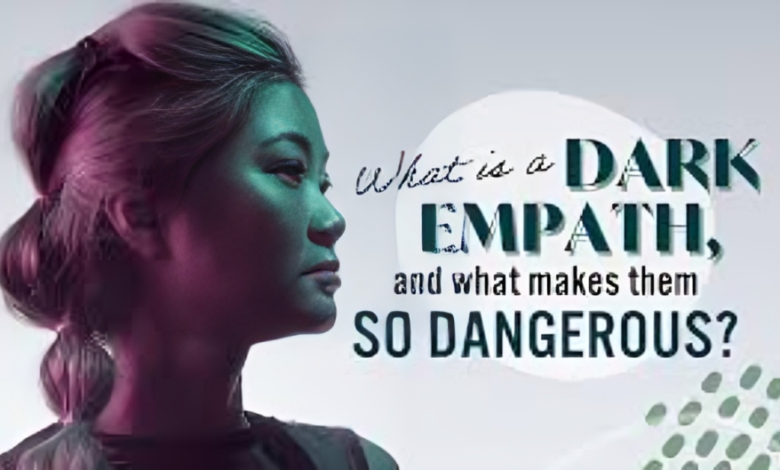Understanding the Dark Empath Traits, Behaviors, and Impact on Relationships

In recent years, the term “dark empath” has gained attention in discussions about personality traits and human behavior. Unlike traditional empaths who are sensitive to others’ emotions and motivated by compassion, dark empaths possess a unique blend of empathy and manipulative tendencies. This article delves into the traits and behaviors associated with dark empaths, how they influence relationships, and the psychological underpinnings behind this complex personality type.
What Is a Dark Empath?
A dark empath is an individual who demonstrates empathy but combines it with “dark triad” traits: narcissism, Machiavellianism, and sometimes even psychopathy. This combination makes dark empaths particularly adept at reading and understanding the emotions of others, which they can exploit for personal gain. Unlike those with purely dark triad traits, dark empaths do not necessarily lack empathy; rather, they possess a unique form of empathy that allows them to better manipulate, charm, or control others.
Key Characteristics of a Dark Empath
- High Empathy with Hidden Agendas: Dark empaths are capable of recognizing and even feeling the emotions of others. However, instead of using this empathy to provide support, they might leverage it to meet their own needs or agendas. This makes them effective manipulators, as they can intuitively sense what others are feeling and use that information to their advantage.
- Charm and Charisma: Many dark empaths are highly charming individuals who attract others easily. Their social skills can make them appear warm, friendly, and trustworthy. However, this charm is often superficial and strategically deployed to gain influence or power over others.
- Subtle Manipulation: Unlike overtly controlling personalities, dark empaths often employ subtle, covert forms of manipulation. They might make suggestions that play on someone’s insecurities, subtly undermine others, or use gaslighting tactics to maintain control without appearing directly confrontational.
- Boundary Testing: Dark empaths are known to test the boundaries of others to see how far they can push them. They may take advantage of others’ kindness, slowly increasing their demands or expectations to gauge the level of tolerance and resilience in their relationships.
- Narcissistic Tendencies: Dark empaths may exhibit narcissistic traits, including an inflated sense of self-importance or entitlement. However, unlike overt narcissists, they often hide these traits behind a façade of humility or kindness, making it difficult for others to identify their true nature.
- Enjoyment of Others’ Discomfort: Although not as common, some dark empaths experience a degree of pleasure when they see others uncomfortable or anxious. This aspect, known as “schadenfreude,” indicates a darker side of their personality, revealing an underlying desire to maintain control or dominance over others.
Psychological Foundations: What Makes a Dark Empath?
Understanding the psychology behind dark empathy requires a look at the dark triad traits individually and how they interact with empathetic abilities.
- Narcissism: Narcissistic traits fuel the dark empath’s need for admiration and validation. This part of their personality can lead them to seek attention and recognition from others, even if it involves bending or breaking ethical rules. Narcissism can also contribute to their tendency to prioritize their own needs above those of others.
- Machiavellianism: Machiavellianism involves a penchant for strategic manipulation and cunning, often with little regard for ethics or morals. Dark empaths can be highly strategic, planning interactions and actions to manipulate others for personal gain. Their empathy allows them to understand people’s motivations and emotions, which they can use to anticipate and exploit weaknesses in others.
- Psychopathy: While not all dark empaths have psychopathic tendencies, some may display certain traits associated with psychopathy, such as a lack of remorse or a diminished capacity for genuine emotional connections. This can allow dark empaths to use their empathy in a detached way, manipulating others without feeling guilty or conflicted.
Interestingly, dark empaths can compartmentalize their actions, rationalizing manipulative behavior as necessary or even justified. This psychological flexibility allows them to maintain a positive self-image while engaging in behaviors that would typically be perceived as harmful or unethical.
Dark Empath Behaviors in Relationships
The unique blend of empathy and dark triad traits in a dark empath makes them particularly impactful in close relationships. Here are some ways dark empaths influence their personal and romantic relationships:
- Emotional Manipulation and Control: Dark empaths can use their empathy to understand what makes their partners tick and might leverage that knowledge to gain control. For example, if they know their partner’s insecurities, they might subtly bring them up during conflicts, pushing their partner to feel guilty or dependent.
- Gaslighting: One of the hallmark manipulation tactics, gaslighting is used by dark empaths to make their partners question their own perceptions. A dark empath might use phrases like, “You’re overreacting,” or “That’s not what happened,” to distort reality, leaving their partner feeling confused and less certain of their own judgment.
- Self-Promotion at the Expense of Others: In group settings, dark empaths may subtly put down others to elevate their own status. They might make small, seemingly harmless comments that cast others in a negative light while positioning themselves as the more competent or admirable individual.
- Hot and Cold Behavior: Dark empaths may alternate between warmth and detachment, a tactic often referred to as “love-bombing” followed by withdrawal. This hot-and-cold behavior creates a cycle of dependency, with their partner becoming more eager to please the dark empath during periods of withdrawal.
- Feigning Vulnerability: Although they often maintain control, dark empaths may feign vulnerability to elicit sympathy from their partner. By sharing selective, curated aspects of their past struggles or insecurities, they encourage their partner to feel protective or nurturing, drawing them closer and furthering the emotional bond.
The Impact of Dark Empaths on Their Partners
Being in a relationship with a dark empath can be emotionally draining and even damaging for the partner. Since dark empaths often prioritize their needs and are skilled at bending situations to their advantage, their partners might feel emotionally exploited or manipulated.
- Decreased Self-Esteem: Partners of dark empaths may experience a decline in self-esteem over time due to the constant boundary-testing and manipulation tactics.
- Emotional Dependency: The cycle of warmth and detachment that dark empaths create can foster emotional dependency in their partners, as they become accustomed to seeking approval or affection on the dark empath’s terms.
- Confusion and Gaslighting: Gaslighting can erode a person’s sense of self-trust and reality, leaving them feeling perpetually confused and dependent on the dark empath for validation.
- Isolation: Dark empaths may subtly influence their partners to become isolated from friends or family, creating a more controlled environment where the partner becomes more reliant on the dark empath for emotional and social support.
How to Identify and Protect Yourself from a Dark Empath
Recognizing a dark empath in your life can be challenging, as they often present themselves as compassionate and attentive individuals. However, certain red flags can help you identify them and take appropriate action to protect yourself.
- Look for Patterns of Manipulation: Observe if there is a pattern of emotional manipulation, such as guilt-tripping, gaslighting, or love-bombing. If you feel your boundaries are being tested regularly, it’s a sign of potential manipulation.
- Pay Attention to Empathy with Strings Attached: If someone frequently shows empathy but appears to expect something in return, this might be a sign that their empathy is not as altruistic as it seems.
- Set Boundaries: Establishing firm boundaries is crucial when dealing with a dark empath. Dark empaths often push boundaries subtly, so clearly communicating your limits can help protect your emotional well-being.
- Seek Support: If you feel you’re in a relationship with a dark empath and are unsure how to proceed, consider talking to friends, family, or even a mental health professional for support and guidance.
Conclusion
Dark empath represent a unique and complex personality type that combines high empathy with manipulative tendencies. Although their ability to understand others’ emotions can be a valuable trait, their propensity for using this empathy to control or manipulate others reveals a darker side of their personality. Recognizing the signs and understanding the potential impact of a dark empath can help individuals make informed decisions in their personal and professional relationships, safeguarding their emotional health and well-being.




